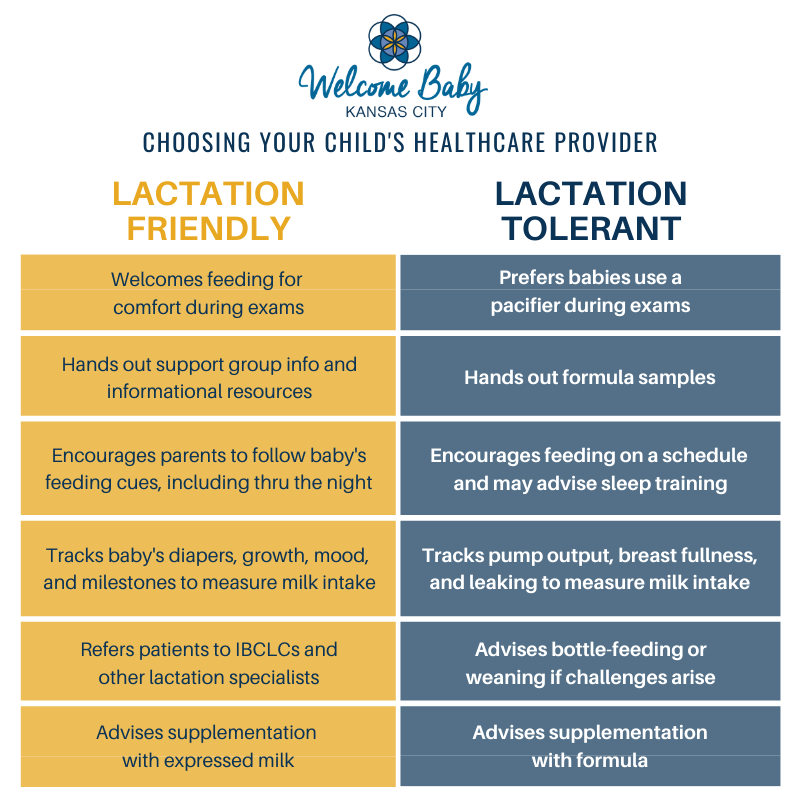CHOOSING YOUR BABY’S LACTATION-FRIENDLY HEALTHCARE PROVIDER
How to find a lactation-friendly doctor or NP to support you and your baby.
Welcome Baby KC wholeheartedly supports however you need or want to feed your baby! Successful baby feeding looks different for every family. Lactation-friendly does not mean anti-formula. You’ll not hear us preach Breast Is Best or Fed Is Best. We’re not here to decide what’s best for you--only you can do that. We’re here to equip you to make informed decisions for yourself and your family so you can meet your unique goals.

“Looking for a pediatrician. Who do you recommend? I want someone who’s breastfeeding-friendly.” I see this question all the time. On social media, from my clients, in my personal circles. And if you ask the Internet, you’ll probably get a variety of recommendations because everybody wants to be helpful and thinks highly of the provider they selected for their baby.
But all of those recommendations can get confusing and might not answer YOUR questions. Who’s going to support me and my baby with feeding? What if breastfeeding/chestfeeding is hard and I need help? How do I know which doctor is the best for us? Keep reading to learn what defines “lactation-friendly” and to learn how to ask the right questions to get the answers you want.
Let’s unpack what lactation-friendly care looks like at the pediatrician’s or family doctor’s office:
- A lactation-friendly provider knows that babies nurse for more reasons than just hunger (tired, overstimulated, cold, cranky, etc) and won’t bat an eye when your baby wants to latch during the appointment. They may even offer you a pillow or may offer to continue baby’s exam while baby is latched!
- A breastfeeding/chestfeeding-friendly provider knows the basics of lactation: Milk is made by supply and demand. The more the baby empties the breasts, the more milk the breasts will make. For this reason, a lactation-friendly doctor will recommend that you follow your baby’s feeding cues around the clock, including at night when your milk-making hormones are highest.
- We all love numbers. We like ounces (mLs for our international friends). We like baby tracking apps. We like filling up a bottle and seeing a baby drain it because then we know baby’s getting enough to eat. Breastfeeding/chestfeeding doesn’t work that way, though, and a lactation-friendly doctor knows and respects that! Instead, they’ll know baby is getting enough milk by asking about baby’s diaper count (5-6+ wets per day), their growth (5-7 ounces per week for newborns), their general mood (hungry babies are usually very upset or very lethargic; happy babies are generally content), and whether baby is meeting milestones.
- Most doctors and nurse practitioners receive very little (if any) education in lactation in medical school. But don’t freak out! That’s okay. A lactation-friendly provider knows their limits, and if feeding challenges arise, they’ll give you a referral to a lactation specialist called an Internationally Board Certified Lactation Consultant (IBCLC). They may even have IBCLCs staffed at their office! Bonus points if they give you information about the various FREE baby feeding support groups in your area.
- Sometimes baby really isn’t getting enough milk. A lactation-friendly provider will recommend nursing more frequently and/or supplementing your own milk before they recommend formula. And then they’ll get you into an IBCLC right away!

So how do you put that all together to find the provider of your dreams? Identify 3-5 providers close to your home who take your insurance or are within your budget. Schedule a prenatal consultation with them, and come prepared with your questions. Well, what questions should I ask? Choose some or all of the following to ask to gather more information about your selected providers:
- What percentage of your patients exclusively breastfeed/chestfeed? At 6 months? At 1 year? (for reference, read about national lactation goals for the US here)
- How do you handle feeding during baby's appointments?
- What do you think about nighttime feeding versus sleep training (teaching a baby to sleep all night)?
- How will we know my baby is getting enough milk?
- What percentage of your patients supplement lactation?
- If I need extra feeding help, which IBCLCs do you recommend?
- Which support groups do you recommend?
- What lactation education or experience do you have?
At the end of each consultation, jot down what you liked, what you didn’t like, and any new questions you might have. Once you’ve finished interviewing your selected providers, compare your notes and then choose one! If at any time you disagree with your baby’s provider or feel uncomfortable with a recommendation, it’s okay to suggest an alternative course of action, to ask more questions, or to ask for a referral to see an IBCLC or other specialist. It’s also okay to try out a completely new pediatric care provider. With these tools in hand, you’re well on your way to meeting your feeding goals!
A gift from us to you.
Please enjoy this Welcome Baby KC Postpartum Affirmations MP3. Really! No strings attached. Enjoy these words of encouragement and truth, straight from our hearts to yours.
